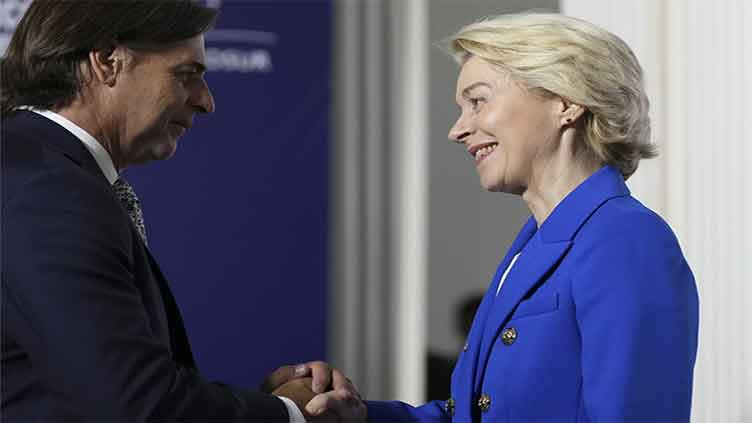The EU and a South American trade bloc reach a giant trade deal after 25 years of talks

Business
The EU and a South American trade bloc reach a giant trade deal after 25 years of talks
MONTEVIDEO, Uruguay (AP) — The European Union reached a blockbuster free trade agreement Friday with Brazil, Argentina and the three other South American nations in the Mercosur trade alliance, capping a quarter-century of on-off negotiations even as France vowed to derail the contentious accord.
Provided it is ratified, the accord would create one of the world’s largest free trade zones, covering a market of 780 million people that represents nearly a quarter of global gross domestic product.
The accord’s proponents in Brussels say it would save businesses some $4.26 billion in duties each year, slashing red tape and removing tariffs on products like Italian wine, Argentine steak, Brazilian oranges and German Volkswagens.
Its critics in France, the Netherlands and other countries with big dairy and beef industries say the pact would subject local farmers to unfair competition and cause environmental damage.
From Uruguay, the host of the Mercosur summit, European Commission President Ursula von der Leyen hailed the deal as a “truly historic milestone” at a time when global protectionism is on the rise.
Under pressure from his country’s powerful and vocal farming lobby, French President Emmanuel Macron said Friday the deal remained “unacceptable” as it stands and stressed that governments have not yet seen “the final outcome” of negotiations.
“The agreement has neither been signed nor ratified. This is not the end of the story,” Macron’s office said, adding that France demands additional safeguards for farmers and commitments to sustainable development and health controls.
For France to block the deal, it would need the support of three or more other EU member states representing at least 35% of the bloc’s population.
The French government, which has been rallying countries to oppose the pact, named Austria, Belgium, Italy, the Netherlands and Poland as other wary states that share French concerns about the deal.
To take effect, the pact must also be endorsed by the European Parliament.
In remarks aimed at her “fellow Europeans,” and perhaps in particular French skeptics, von der Leyen promised the accord would boost 60,000 businesses through lower tariffs, streamlined customs procedures and preferential access to raw materials otherwise supplied by China.
“This will create huge business opportunities,” von der Leyen said.
She then turned to address European farmers who fear that an influx of cheap food imports will jeopardize their livelihoods. South American countries do not have to adhere to the same standards for animal treatment and pesticide use.
“We have heard you, listened to your concerns, and we are acting on them,” von der Leyen said.
Outrage over environmental rules, rising costs and unregulated imports has unleashed massive farmers’ protests across the continent over the past year.
Leaders on both sides of the Atlantic who long have pushed for the deal praised the announcement Friday, welcoming the results as a boon for export industries.
It marks the first major trade agreement for Mercosur, which is comprised of Argentina, Brazil, Uruguay, Paraguay and, newly, Bolivia. The bloc had previously only managed to conclude free-trade deals with Egypt, Israel and Singapore.
“An important obstacle to the agreement has been overcome,” said Chancellor Olaf Scholz of Germany, where the nation’s vaunted car industry is poised to profit.
From Spain, Prime Minister Pedro Sánchez called the agreement “an unprecedented economic bridge.”
At the Mercosur summit in Uruguay’s capital of Montevideo, Brazil’s President Luiz Inacio Lula da Silva praised “a modern and balanced text which recognizes Mercosur’s environmental credentials.”
“We are securing new markets for our exports and strengthening investment flows,” he said.
The Brazilian Trade and Investment Promotion Agency said it expects the pact to boost the nation’s Europe-bound exports by $7 billion.
Libertarian President Javier Milei of Argentina described the accord as aligning with his free market principles. Argentines are excited about selling more beef and agricultural products in the EU.
The deal is the product of 25 years of painstaking negotiations, dating back to a Mercosur summit in Rio de Janeiro in 1999. Talks collapsed over differences in economic priorities, regulatory standards and agricultural policies. The rise of protectionist tendencies also repeatedly upended hopes.
Momentum picked up in 2016, as former President Trump imposed harsh tariffs on Europe. At the same time, market-friendly governments came to power in South America’s biggest economies, Brazil and Argentina, which had been closed for years.
In June 2019, negotiators announced a deal that included provisions for tariff reductions and commitments to environmental standards.
But it was never implemented. In Brazil, the region’s economic powerhouse, right-wing former President Jair Bolsonaro in Brazil, presided over record levels of deforestation in the Amazon, prompting EU governments to demand tougher sustainability criteria. In Argentina, a new left-wing protectionist government opposed the deal.
But things picked up as the region’s politics shifted again in 2023. Brazil’s President Lula rode to power on pledges to rein in illegal logging, soothing concerns that the pact could accelerate deforestation. Argentina’s Milei is working to open the nation’s notoriously closed and crisis-stricken economy.
But if past EU trade agreements are any indication, ratification could take years.
“We celebrate it, but it’s still far from reality,” Milei said of the accord.
In 2016, the EU and Canada signed a pact, known as the Comprehensive Economic and Trade Agreement, or CETA, but the approval process is still lumbering along.
Germany’s parliament only signed off on that pact two years ago, and the French Senate rejected it in March this year.
“Anyone with any memory is skeptical,” said Brian Winter, a vice president of the New York-based Council of the Americas. “They have trotted out leaders and declared victory and celebrated, and yet there always seems to be a hitch.”


